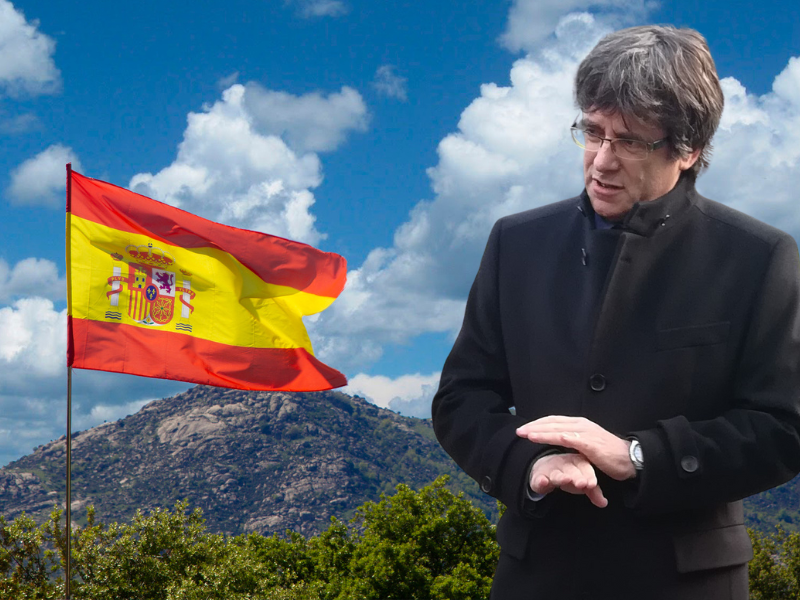In Sunday’s election, the right-of-center federalist parties got 169 seats, falling seven seats from a majority (assuming they could work together to form Spain’s next government).
The left-of-center federalist parties got 153 seats. In addition, they have good prospects of picking up support from three left-of-center regionalist parties totaling 14 seats. Adding these in, the left-of-center block totals 167 seats, falling nine seats from a majority.
The remaining 14 seats are of center or center-right regionalist parties:
1. Seven seats of the pro-independence Junts (“Together”) party of Catalonia;
2. Five seats of the Basque Nationalist Party;
3. One seat of the regionalist party of the Canary Islands; and,
4. One seat of the regionalist party of Navarre.
For various reasons, these regionalist parties are reluctant to join into a pro-federalist coalition even though they broadly agree on the usual issues separating left and right. In particular, the right-of-center federalist parties are strongly pro-federalist, and the Junts of Catalonia are strongly pro-independence.
The Junts definitely wants amnesty for those who took part in the 2019 declaration of independence by the regional parliament of Catalonia, including its leader Carles Puigdemont currently living in exile in Belgium. In addition, Junts would want at least a framework for moving ahead on independence.
According to the U.S. declaration of independence, governments gain their just powers from the consent of the governed. This view stands in stark contrast to the former view that government rests on the right of conquest, usually couched in an historical narrative. For example, as stated by Vladimir Putin, Ukraine is part of Russia because of historical considerations.
To be sure, there are practical problems that have to be considered. For example. is a proposed country viable? But, generally, if we’re talking of an identifiable people in an identifiable place, international sentiment is inclined to look at some form of devolution when there are irreconcilable differences between a larger nation and one or more of its parts.
Recent examples include the independence of East Timor from Indonesia (a Catholic part of a Muslim country), and the creation of the semi-autonomous region of Bangsamoro in the Philippines (a Muslim part of a Catholic country). Also, South Sudan (a black and Christian place that broke away from an Arabic and Muslim place), and Kosovo (a Muslim place that has effectively broken away from a Orthodox Christian place).
The United Kingdom has devolved considerable power to its constituent nationalities, and the Russian Federation recognizes certain of its federal subjects as Republics (as opposed to Oblasts), with significant power over matters of language and culture. In theory, a liberal state could use private property, free association and privacy to recognize considerable freedom at the individual level (but progressives and conservatives continually vie with each other to regulate what would be private matters from a liberal perspective). Also in theory, devolution of (non-liberal) government can be complemented by mutual defense and free trade agreements so as to gain the advantages of a large country.
Turning to Catalonia, an impetus to regionalization was control over local schools, roads and other prerogatives of local government. Being a relatively rich region of Spain, it saw its tax dollars going to Madrid, only to come back short-changed and with strings attached. Other regions treated as nationalities within Spain such as the Basque region, control their own taxes in support of these expenditures. Why shouldn’t Catalonia?
Even though Catalonia subsequently gained the status of a nationality with Spain, impetus for full independence remained. Or did it?
Looking at the vote in Barcelona and the three other parts of Catalonia on Sunday, pro-independence parties (the left-of-center ERC and the right-of-center Junts) totaled only 14 seats out of 46. Federalist parties totalled 32 seats. The strength of the independence movement might not be what it once was.
Among the practical problems of independence are access to the sea, the integrity of road networks, railroads, power lines, pipelines, water rights, free trade, the movement of capital and labor, industrial standards, and defense. Also, the split of the national debt and any national assets. These were not and probably could not have been addressed in Catalonia’s unilateral declaration of independence. The split of the Czech Republic and Slovakia of the former Czechoslovakia are a good example of what can and should be done.
With both the Czech Republic and Slovakia remaining members of the EU and NATO, almost all matters of potential controversy were resolved. About all that remained to be settled was for a bunch of accountants to go around the country to total up the values of national assets in each part and to net the imbalance of national assets against the parts of the national debt each part was to inherit.
I suspect that the more the voters of Catalonia examine the issue, the more they will see that it won’t result in Nirvana, and that being recognized as a nationality has already addressed the main inequity in the prior arrangement. But, should the people of Catalonia, voting in a plebiscite, choose independence, it’d be addition by subtraction. Catalonia voted overwhelmingly for left-of-center parties on Sunday. Without the net left-of-center seats from there, what remains of Spain would be much more conservative. And, the socialists of Catalonia will have fewer “other people” from whom to tax and redistribute the wealth.





